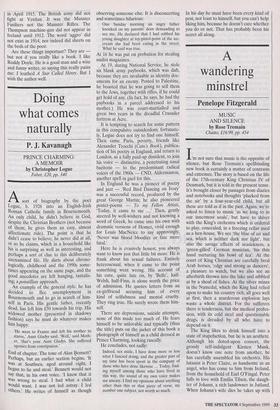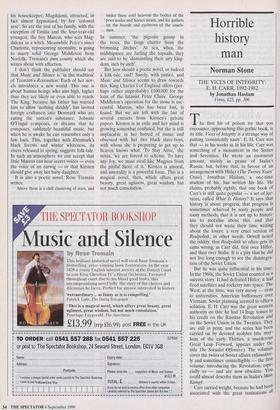A wandering minstrel
Penelope Fitzgerald
MUSIC AND SILENCE by Rose Tremain Chatto, £16.99, pp. 454 I'm not sure that music is the opposite of silence, but Rose Tremain's spellbinding new book is certainly a matter of contrasts and extremes. The story is based on the life of the 17th-century King Christian IV of Denmark, but it is told in the present tense. It's brought closer by passages from diaries and notebooks and thoughts 'plucked from the air' by a four-year-old child, but all these are told as if in the past. Again, we're asked to listen to music 'as we long to in our innermost souls', but have to shiver with the King's orchestra which is ordered to play, concealed, in a freezing cellar used as a hen-house. We see 'the blue of air and sea, which is neither dark nor light', but also the savage effects of seasickness, a `green-gilled' German musician, 'his thin hand nurturing his bowl of tea'. At the court of King Christian are carefully bred Arab horses, 'edgy and strong as dancers', a pleasure to watch, but we also see an afterbirth thrown into the lake and nibbled at by a shoal of fishes. At the silver mines in the Numedal, which the King had relied upon to make his country rich, all goes well at first, then a murderous explosion lays waste a whole district. For the sufferers there is tenderness, but the medical profes- sion, with its cold steel and questionable drugs, is dreaded by all who have to depend on it.
The King likes to drink himself into a state of stupefaction, but he is an aesthete. Although his doted-upon consort, the grossly self-indulgent Kirsten Munk, doesn't know one note from another, he has carefully assembled his orchestra. His lutanist is Peter Claire, as handsome as an angel, who has come to him from Ireland, from the household of Earl O'Fingal. Peter falls in love with Emilia Tilsen, the daugh- ter of Johann, a rich landowner in Jutland. When Johann's wife dies he takes up with his housekeeper, Magdalena, attracted, in fact almost hypnotised, by her 'colossal arse'. So are the rest of his family, with the exception of Emilia and the four-year-old youngest, the boy Marcus, who sees Mag- dalena as a witch. Meanwhile Peter's sister Charlotte, representing normality, is going to marry solid George Middleton from Norfolk, Tremain's own county which she writes about with affection.
I don't think the publisher should say that Music and Silence is 'in the tradition' of Tremain's Restoration. Each of her nov- els introduces a new world. This one is about human beings who aim high, higher than they are likely or even able to reach. The King, because his father has warned him to allow 'nothing shoddy', has invited foreign craftsmen into Denmark who are eating the nation's substance. Johnnie O'Fingal composes, or dreams that he composes, sublimely beautiful music, but when he is awake he can remember only a few bars. This, together with Denmark's black forests and winter whiteness, its rivers released in spring, suggests folk-tale. In such an atmosphere we can accept that little Marcus can hear secret voices — even the voice of an earwig — or that Kirsten should give away her baby daughter.
It is also a poetic novel. Rose Tremain writes:
Above them is a chill clustering of stars, and under these cold heavens the bodies of the poor mules and horses steam, and ice gathers on the beards and eyebrows of the coach- men.
In summer, 'the pigeons gossip in the trees, the frogs chatter from the brimming ditches'. At sea, when the midshipmen are furling the topsails, they are said to be 'dismantling their airy king- dom, inch by inch'.
But how should a poetic novel, or indeed a folk-tale, end? Surely, with justice, and Music and Silence seems to draw towards this. King Charles I of England offers (per- haps rather improbably) £100,000 for the loan of the lutanist Peter Claire. George Middleton's operation for the stone is suc- cessful. Marcus, who has been lost, is found. But we are left with the last of several extracts from Kirsten's private papers. Kirsten is in exile and her mind is growing somewhat confused, but she is still implacable in her hatred of music and obsessed with her two black slave-boys, with whom she is preparing to get up to heaven knows what. 'To Stay Alive,' she notes, 'we are forced to scheme. To have any Joy, we must steal like Magpies from the pitiful Store of it.' Kirsten is amoral, and amorality is a powerful force. This is a magical novel, then, which offers great beauty, great ugliness, great wisdom, but not much consolation.



























































 Previous page
Previous page